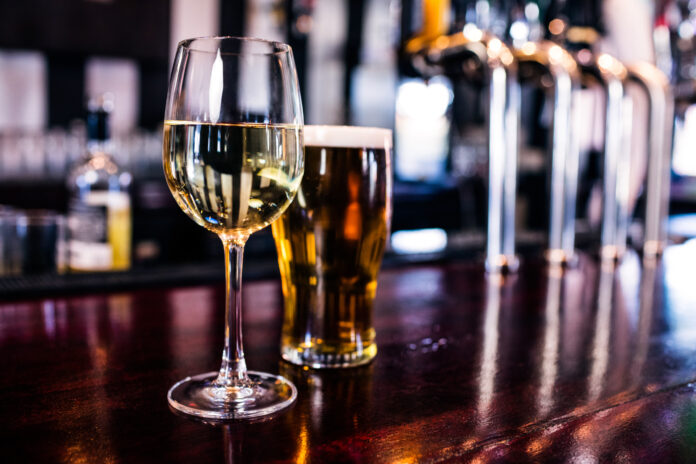(The Center Square) – When the pandemic first hit, business slowed to a crawl for Alex Villicana, owner of Re:Find Distillery and Villicana Winery in Paso Robles.
With tasting rooms shut down due to COVID-19, Villicana was left with limited options to distribute his spirits and wine products to customers. Before the pandemic, Villicana had partnered with a few restaurants to distribute his spirits, but when many establishments shuttered during the first few months of the pandemic, working with distributors proved to be a challenge.
So, when the state passed an emergency order allowing distilleries to ship directly to consumers, Villicana and his staff jumped at the opportunity to send their spirits across the state directly to their customers’ doors.
“It was a huge savior to us,” Villicana told The Center Square. “For us to keep the lights on, we started reaching out online to people who would come to the distillery and tried our spirits and told them we were allowed to ship. We were able to generate enough revenue to basically keep the lights on and keep our employees employed.”
Under existing law, wineries can ship directly to consumers, but distilleries are prohibited. But a temporary emergency order passed in 2020 allowed distillers to send their products directly to customers, saving many businesses from bankruptcy as the pandemic continued.
However, the provisions in the emergency law are set to expire at the end of March. With the clock ticking, several lawmakers filed legislation that would permanently allow distilleries to ship direct to consumers, maintaining a stream of sales revenue for distillers hit hard by the pandemic.
The proposal, outlined in Senate Bill 620, would authorize licensed distillers to send spirits directly to a California resident 21 or older. The bill would apply to licensed distillers located in state and out of state. If the permit holder is located out of state, they would be required to pay all applicable taxes and be in full compliance with the California Beverage Container Recycling and Litter Reduction Act.
The bill will likely be considered by the Senate Monday, running right up against a legislative deadline. Since the bill was introduced last year, it must pass the Senate on Monday to advance.
Senator Ben Allen, D-Santa Monica, who introduced the bill in February 2021, said in a statement that the passage of this bill would help small distilleries across the state by ensuring customers have access to products that are not found in stores.
“One of the silver linings of this pandemic has been the development of creative policy ideas spurred by the need to adjust to life under COVID,” Allen said. “Direct-to-consumer shipping of wine has already existed in the state for more than three decades. I’ve heard from distillers across the state, including in my community, and consumers should be afforded the same opportunity.”
The bill has won support from several entities, including the Distilled Spirits Council. Supporters say the bill would offer continued support for distillers who are still in the midst of operating during the pandemic.
“Direct-to-consumer shipping of spirits has served as a critical lifeline for many California distilleries hit hard by the pandemic,” Lisa Hawkins, senior vice president of public affairs at the Distilled Spirits Council, told The Center Square. “These distilleries play an important role in their communities by creating jobs, supporting local agriculture and boosting tourism. Making this sales channel permanent would provide much-needed support to distillers as they try to navigate the uncertainty of the pandemic and grow their businesses.”
Villicana said during the pandemic, about 20-30% of his revenue was produced by shipping directly to consumers. In the future, he believes direct sales could account for a more significant share of profits but noted that many distillers are hesitant to put marketing dollars behind it if the law remains in effect only temporarily.
The law has faced opposition from several groups, including the California Labor Federation and the California Beer and Beverage Distributors. Opposition groups have cited concerns about an interruption in the state’s three-tier distribution system as a result of SB 620. Others have voiced opposition over the potential impact on jobs.
“SB 620 will have a dramatic impact on the number and quality of jobs performed by our members across the state,” the California Teamsters Public Affairs Council said in a statement. “Distilled spirits wholesalers in California employ over 5,000 employees, most of who are Teamster members. Likewise, small and large retailers employ tens of thousands of Californians at brick and mortar grocery and liquor stores.
“This bill would allow out-of-state distillers to bypass those businesses and the jobs they create, threatening the vitality of those employed here in California.”
Supporters of the bill have pushed back on this notion, however, pointing to the success of the wine industry in incorporating direct sales into its distribution practices. Villicana said the majority of wine distribution still goes through a three-tier system, even though wineries can ship directly to customers, which has led to growth for both retailers and wholesalers.
“If history is any example of what can happen, everybody is going to gain out of (SB 620),” he said.
Hawkins added that direct-to-consumer shipping can serve as an on-ramp to the three-tier system for distillers.
“It allows distillers to introduce consumers to new spirits products and build demand for them,” she said. “The end goal is for distillers to be able to grow a brand to a point where they can partner with a distributor to provide more efficiency and broader reach.”
Originally published by The Center Square. Republished with permission.









[…] post Commie California Legislators to Consider Permanent Distillery-to-Home Liquor Delivery appeared first on Heartland Daily […]